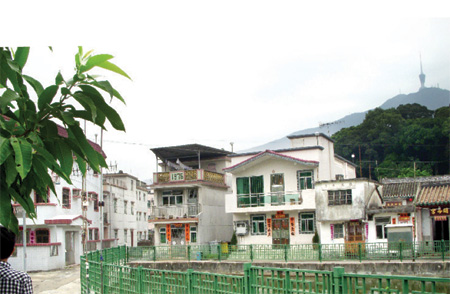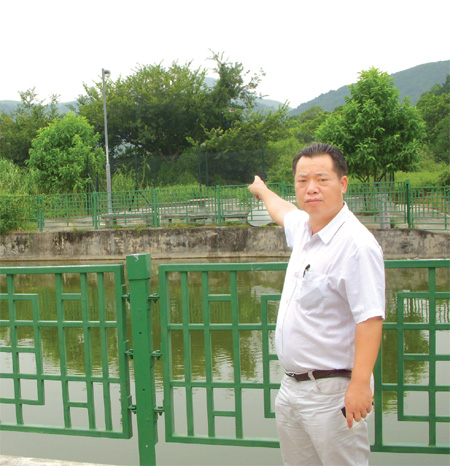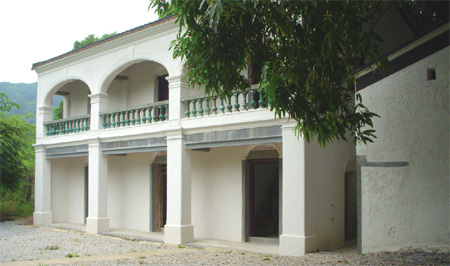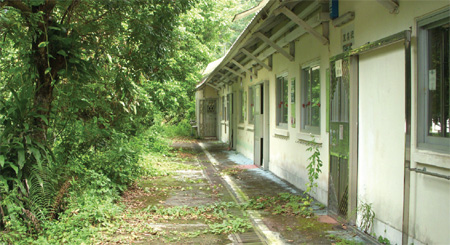Soldiers of their heritage
Updated: 2011-09-28 07:01
By SL Luo(HK Edition)
|
|||||||
|
The tranquil surroundings at Lin Ma Hang, with the fung shui pond fronting the rows of small houses, and the scenic tower at Shenzhen's Wutongshan National Forest Park in the background. Provided to China Daily |
Inhabitants of the historic Lin Ma Hang Village are locked in a "life and death" struggle with the government they accuse of plundering their land in violation of the Basic Law. The villagers have vowed to oppose the action at all costs. The stand-off has evoked tearful memories of the indigenous clans�� long battle for their rights and the preservation of the village built by their ancestors nearly 400 years ago. SL Luo reports.
Yip Wah-ching and two of his fellow clansmen greeted me as if I had been sent by Justice Bao Qingtian to deliver a verdict in their favor.
They had come to the meeting armed with piles of "certified" documents and graphic illustrations which they hoped would set the record straight, to "get things right". They came armed with a message to tell the authorities to "stop outraging the modesty of our village and its people", as they put it, and displaying outright their unbridled emotion.
"You've come at the right time to listen to us," Yip blared with an uninviting grin, although I had neither brought along that sacred edict they might have hoped for, nor whipped up enough dogma to see them through.
"We're under siege, but we'll fight until we drop. The government will never get a single inch of the land bequeathed to us by our ancestors. We'll never surrender our traditional dignity and prestige," he vowed.
Yip, a diversified businessman in his own right, has found himself at the forefront of an acrimonious showdown - the latest in a string of sometimes rowdy spats between indigenous New Territories villagers and the Hong Kong government. The two sides have clashed over issues ranging from land ownership and livelihood to illegal structures. Yip is today the village chief and the declared spokesman for the Yip clan - one of the six most prominent groups of inhabitants settled at Lin Ma Hang Village. The clan's history there dates back almost four centuries to the Ming Dynasty. They were the last of the clans to set foot there. The Tsangs were the first, then the Laus, the Cheungs, the Sins and the Koons.
Lin Ma Hang is a remote haven that sits in a deep valley surrounded by mountains in the Frontier Closed Area at Sha Tau Kok in the northernmost New Territories. Sandwiched between Hong Kong and Shenzhen, it remained virtually unknown to the outside world until a tiff between villagers and the authorities blew up. The villagers drew together in an unparalleled show of clan unity as its masters stood for what they call their "untouchable" rights.
Deep-rooted distrust and suspicions between the two sides have failed to dissipate. After the most recent run-in between the Heung Yee Kuk (the Kuk), the powerful rural advisory body looking after the welfare of an estimated 1 million New Territories' indigenous inhabitants, and the government, the distrust continues to affect the climate like a dark cloud. The last confrontation came in February. Villagers from some 40 families at Choi Yuen Tsuen, Shek Kong, clashed with workers poised to demolish village homes to make way for the HK$67 billion Guangzhou-Shenzhen-Hong Kong rail link. Fortunately, no blood was spilled after a mystery philanthropist made a sizeable donation to help the villagers rebuild their homes.
Re-emergence of that Good Samaritan to restore amity of the latest stand-off seem distinctly remote. Today, the lives of more than 100,000 indigenous people are likely to be affected under the government's proposed freezing of 54 plots of private land across the New Territories. The government says its plan is intended to meet conservation targets, and to block private development from encroaching on vast areas of country parks.
At the heart of the issue is a decision taken back in 2008, when the Town Planning Board designed 2,400 hectares of privately owned land spread across the northern New Territories as having special scientific interest (SSI). The decision ostensibly was taken in the name of preservation of natural environment conservation and protection of heritage. The government remains adamant that there was no legal wrangling involved and that the decision was part of rural planning procedures. The Kuk and the indigenous population see it differently. They call it "highway robbery". The land is indisputably theirs. They inherited from their great, great grandfathers in an unbroken line extending for hundreds of years.
The Kuk is headed by property tycoon and veteran politician Lau Wong-fat. He's been called the "Land Emperor" of the New Territories. Lau has spearheaded several, sometimes heated, encounters aimed at forcing a wake out of the impasse, since the special scientific interest declaration. He's made little headway with his effort He continues to hold out an olive branch, on condition that the government agree to one of two options - an exchange of land or appropriate financial compensation.
Lin Ma Hang is at the center of the confrontation, with about 600 hectares, or more than a quarter of the designated total area, located within its immediate environs. There are at present, only about 150 residents still living in the 200-odd small brick and stone houses in the predominantly Hakka community. At its peak the community boasted a population of about 10,000. Since then, the younger folk have pulled up stakes and moved on. Most of those who remain are elderly. Ancestral pride aside, the villagers say their livelihood will be severely threatened if the government goes head and "invades" their territory with the SSI plan. For instance, the 2-km-long Lin Ma Hang Stream, which bisects the village, has been used for storing or drainage water and to irrigate crops since ancestral times. The waterway also is home to dozens of species of freshwater fish, half of them native to Hong Kong.
"This is a criminal infringement of our sacred ancestral rights and privileges to which we are entitled under Sections 40 and 105 of the Basic Law. These are recognized even by Beijing, but not the Hong Kong government," says Yip. Now he is throwing down the gauntlet, unleashing his full influence as the head of scores of village, religious and war veterans' associations, to fight for justice.
"This is our livelihood, freedom and traditional way of life, all at stake and being ravaged by the authorities with this SSI plan. Lin Ma Hang is purely the blood and sweat of our ancestors which can never be taken away, let alone destroyed," he says, drawing a simile. "It's like handing over the keys to your home to a stranger who can enter it any time and do whatever he likes."
Octogenarian Yip Mee-fook, told China Daily that Lin Ma Hang, where he has lived for nearly half a century, has been home to 14 generations of fellow clans folk, reminding the government to stop bullying the indigenous population.
"I'll organize an army to defend this village with our lives, and blood will spill if they come in and force it on us," he says in a voice choked with emotion, recalling the trials people had to stake out their rights and claims to ancestral properties.
Yip dismissed the government's argument that the village falls under the category of a natural environment in need of protection. He pointed to the pool of construction work undertaken by the villagers. That including constructing concrete curbs to control the flow of water up and downstream, to make the place a permanent home not only for themselves but for future generations.
He also took a swipe at environmental groups for "messing around" with Lin Ma Hang, claiming the government is under tremendous pressure to kowtow to local and international conservation concerns.
"The Yips had fought hard to build and preserve Lin Ma Hang. If the authorities strip us of our hard-earned homes without any consultation and respect for us, I'm not afraid to die defending our rights. They can shoot us, we don't care," Yip Mee-fook warns.
Lin Ma Hang's elderly folk, recognize they are not likely to remain masters of their village. The offspring of thousands of village compatriots have emigrated abroad and are expected to try to eke out their living following the much anticipated opening of the Frontier Closed Area, although such a date may seem far off.
Villagers also take special pride in Lin Ma Hang, which took its name from a fruit. Local people see the village as a "cradle" of good fung shui - the ancient Chinese art used to gauge the health and fortune of a place's inhabitants. There is the fung shui woodland, a lead mine, and, most conspicuously, the bow-shaped fung shui pond erected right in the center of the village, pointing like an arrow at a "target" between the steep mountains in the distance. To the villagers it reflects peace, tranquility and prosperity. "This bow and arrow set-up was planned and erected by our ancestors, and serves as a powerful weapon against aggressive forces," Yip Wah-ching explains. There are also ancestral halls dotted around the village where public or family festive occasions are held from time to time to bless local inhabitants with good luck and health. The story goes that when it all began, Lin Ma Hang was the only village in the area that was free of crime, epidemics and diseases, and the community has had the reputation of having produced an impressive array of barristers, doctors, engineers and other top professionals. Rumors also abound that the village has seen no less than 10 of its inhabitants striking jackpots, collecting huge windfalls in the local Mark 6 as well as overseas lottery draws, with one winning a massive HK$600 million in a European lottery sweep.
Lin Ma Hang's credentials and the inhabitants' steadfastness are certainly not something that can be taken in their stride in view of the immense influence that Yip Wah-ching and his clansmen wield both within and without the Kuk.
Whatever the outcome of the crisis, Yip Wah-ching sees four possible scenarios in the event of talks with the government going to the wall: "We'll organize a lockdown of the entire village to block outsiders from coming in. Protests will be stepped up with the Heung Yee Kuk leading the way. Indigenous land owners abroad will be asked to join in and approach Chinese embassies in various countries to intervene. Legal action will be taken against the Hong Kong government as villagers press their case that says the government is violating the Basic Law and human rights," he warns.
The Kuk has not been slow to condemn the government's move as "unreasonable" while still leaving the door open to negotiations. Daniel W.K. Lam, one of the Kuk's vice-chairmen, urged the authorities to walk the extra mile to communicate with villagers and to hold further consultations with them. He says if matters fail to turn out the way the Kuk or the villagers want, dispatching a delegation overseas to amass increased backing for their plight is on the cards.
"We hope the government will explore all avenues and reopen channels of communication with the Kuk to try to resolve the issue. The government should defer its decision to allow all parties more time to discuss a way or ways out of the crisis," he says.
Lam, a former Legislative Council member, wants the government to return to the negotiating table on the basis of a review undertaken by a former lands director in 1994. That review concluded that appropriate compensation should be considered under the circumstances.
The final decision to implement the SSI plan rests with Chief Executive Donald Tsang Yam-kuen, who has until Dec 31 this year to sign it into law. A victory for Lin Ma Hang, however slim the chance may be, will be seen as a seal of continued confidence in the leadership of the Kuk and its unshakable standing as the sole legitimate voice of the indigenous people.
|
Village chief Yip Wah-ching points in the direction of the distant "target" of the bow-and-arrow-shaped fung shui pond built to defend the village from aggressive forces. Provided to China Daily |
|
The residence of indigenous inhabitant Ip Ting-sz, tucked away in a corner of the village, is a declared Grade A monument. The government claims to have spent HK$9 million renovating the building where Sun Yat-sen once lived. Provided to China Daily |
|
The abandoned Lin Ma Hang Primary School, built in the 1950s but closed down in 2008 owing to poor enrolment, won the Best School Environment Prize awarded by the education department in the 1980s. Provided to China Daily |
(HK Edition 09/28/2011 page4)



